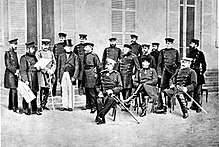
Robert von Keudell (27 February 1824 - April 25/26 1903) was a German diplomat, politician and music lover.

Robert von Keudell (27 February 1824 - April 25/26 1903) was a German diplomat, politician and music lover.
Von Keudell's parents were the Prussian major Leopold von Keudell (1769-1831) and his wife Wilhelmine von Hartmann (1789-1848). He was born in Königsberg. Keudell studied law at the Albertina University in Königsberg.
Keudell was an excellent pianist and admirer of Robert Schumann, with whom he corresponded from 1847 to 1853. His two wives were also talented pianists. His second wife played with Joseph Joachim and Anton Rubinstein, among others. In 1839-1840 he had become acquainted with Fanny Hensel in Italy and had encouraged her composition. [1]
From 1872 to 1873 he was German envoy at the Sublime Porte in Constantinople. In 1873 he became envoy to the Quirinal in Rome and - as a result of the embassy upgrading from 1876 - German ambassador in Italy (until 1887). As a member of the Free Conservative Party he sat in the Reichstag in 1871/72 and from 1890 to 1893. From 1870 to 1872 and again from 1889 to 1893 he was a member of the Prussian House of Representatives. [2] He was a close friend of the German Chancellor Otto von Bismarck.
Robert von Keudell married on February 1, 1870 Hedwig Louise von Patow (1842–1882), a daughter of the politician Robert von Patow. After the death of his first wife, he married Alexandra von Grünhof (1861–1933), daughter of the Duke Ernst von Württemberg (1807–1868), and granddaughter of Duke Alexander of Württemberg and Princess Antoinette of Saxe-Coburg-Saalfeld. They had three children together:
Robert von Keudell died on April 25/26 1903 in Chojna.

Fanny Mendelssohn was a German composer and pianist of the early Romantic era who was known as Fanny Hensel after her marriage. Her compositions include a string quartet, a piano trio, a piano quartet, an orchestral overture, four cantatas, more than 125 pieces for the piano and over 250 lieder, most of which were unpublished in her lifetime. Although lauded for her piano technique, she rarely gave public performances outside her family circle.
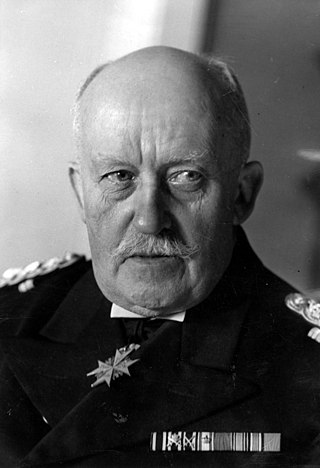
Adolf von Trotha was a German admiral in the Kaiserliche Marine. After the German revolution he briefly served as the first Chef der Admiralität, which replaced the imperial Reichsmarineamt. After supporting the Kapp-Lüttwitz Putsch of March 1920 he resigned his post. He later held several political and maritime posts in the Third Reich.
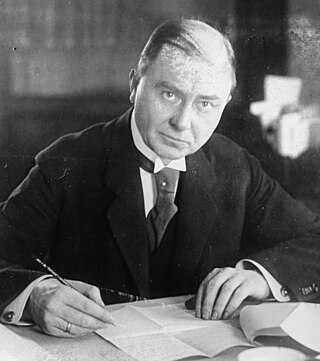
Karl Jarres was a German lawyer and politician of the German People's Party during the Weimar Republic. From 1923 to 1924, he was the minister of the Interior and vice-chancellor of Germany. Jarres was also the long-serving mayor of Duisburg from 1914 to 1933. After the Nazis deposed him, he started a career in industry.
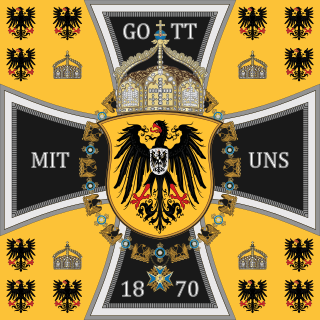
The Imperial German Army (1871–1919), officially referred to as the German Army, was the unified ground and air force of the German Empire. It was established in 1871 with the political unification of Germany under the leadership of Prussia, and was dissolved in 1919, after the defeat of the German Empire in World War I (1914–1918). In the Federal Republic of Germany, the term Deutsches Heer refers to the German Army, the land component of the Bundeswehr.

Eduard Ernst Friedrich Hannibal Vogel von Fal(c)kenstein was a Prussian General der Infanterie.
Walter Friedrich Julius Köhler was a German Nazi Party politician who served as the Minister President of Baden in Nazi Germany from 1933 to 1945.

The Mendelssohn family are the descendants of Mendel of Dessau. The German Jewish philosopher Moses Mendelssohn and his brother Saul were the first to adopt the surname Mendelssohn. The family includes his grandchildren, the composers Fanny Mendelssohn and Felix.

The Reichstag of the North German Confederation was the federal state's lower house of parliament. The popularly elected Reichstag was responsible for federal legislation together with the Bundesrat, the upper house whose members were appointed by the governments of the individual states to represent their interests. Executive power lay with the Bundesrat and the king of Prussia acting as Bundespräsidium, or head of state. The Reichstag debated and approved or rejected taxes and expenditures and could propose laws in its own right. To become effective, all laws required the approval of both the Bundesrat and the Reichstag. Voting rights in Reichstag elections were advanced for the time, granting universal, equal, and secret suffrage to men above the age of 25.

Walter von Keudell was a German forest expert and politician. He served as interior minister of Germany between 1927 and 1928 during the period of the Weimar Republic.
Thomas Kühne is a German historian. He holds the Strassler Chair for the Study of Holocaust History and is the Director of the 'Strassler Center for Holocaust and Genocide Studies' at Clark University, Massachusetts. His Research and teaching focuses on genocides and wars in modern European history, especially on Holocaust perpetrators and bystanders; he also engages in the study of masculinities and of body aesthetics.
Heinrich Johann Kampschulte was a German Roman Catholic priest, Catholic Centre Party politician and an historian.

Adolf Hermann Wilhelm Hagen was a public official in Prussia. He was also a banker and a liberal politician.
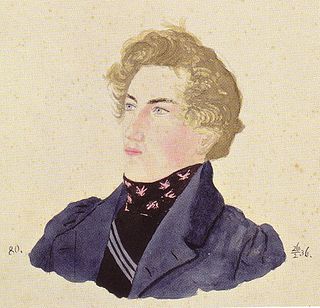
Otto Saro was a Prussian lawyer who in 1879 or 1880 became the chief state prosecutor in Königsberg. He was also a Conservative politician, serving as a member of the Imperial Reichstag (parliament) between 1878 and his death ten years later.
Moritz Baerwald was a German lawyer and politician of the German Democratic Party, a member of the Prussian House of Representatives and the Weimar National Assembly.

Praschma or Pražma is a Moravian noble family.
Maximilian von Jaunez, commonly known as Max Jaunez, was a French-German industrialist and politician. From 1903 to 1907, he served in the Reichstag of the German Empire and from 1900 to 1917, he served as the General Councilor of Volmunster. Jaunez owned and operated the Utzschneider & Ed. Jaunez ceramics factory in Sarreguemines and was the owner of the Chateau de Rémelfing.
Gustav Adolf Karl Joachim Rüdiger Graf von der Goltz was a German lawyer and Nazi Party member who, in the years before they came to power, defended many prominent Nazis, including Joseph Goebbels. He was also a member of the Reichstag and the Prussian State Council.
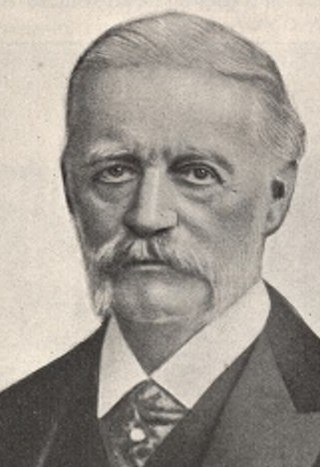
Count Lazarus IV Henckel von Donnersmarck, also spelled Łazarz IV, was a German politician and landowner. He was a founding member of the Centre Party and sat in the Prussian House of Representatives from 1870 to 1876 and in the Reichstag from 1884 to 1887.